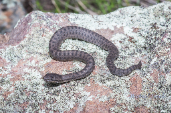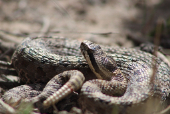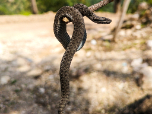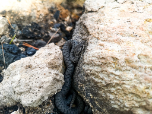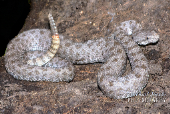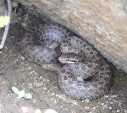Western Twin Spotted Rattlesnake (Crotalus pricei pricei)
Description: Adults of C. pricei usually do not exceed about 20–24 inches in total length (including tail). The maximum total length recorded is 26 inches. The color pattern consists of a gray, bluish-gray, brownish-gray, or medium- to reddish-brown ground color, usually with a fine brown speckling. This is overlaid with a series of dorsal blotches that tend to be divided down the median line to form 39-64 pairs.
Habitat: This species is a mountain rock dweller of pine-oak woodland, grassy and brushy areas, and open coniferous forest, usually occurring on well-lit rocky slopes such as south-facing talus. In Mexico, it is also found in grassy-shrubby mountain valleys where prey is abundant, on pinyon pine-agave slopes, and in limestone-scrub oak-agave habitats where pines have been reduced by logging. This snake was found among stumps and coarse woody debris in July in high-elevation pine-oak forest in Sierra del Nido, Chihuahua. In autumn (fall), individuals may shift from summer habitat to a different winter habitat (e.g., a different talus slope or beneath surface cover in a non-talus site.
Range: This small rattlesnake can be found in southeastern Arizona and down through Mexico along the Sierra Madre Occidental. In Arizona, it is limited to just four isolated mountains.
Found in these States:
AZ
Venom: Being a rattlesnake, the Twin-Spotted Rattlesnake is venomous although its bite is not lethal, most of the time anyway. These snakes’ venom is classified as hemotoxic which means that when it bites something, the surrounding blood cells, muscles, and tissue start to break down. If left untreated, this can lead to necrosis, further muscle damage, and even death if you have a bad enough reaction to it.
Given their small size, the Twin-Spotted Rattlesnake is not likely to bite humans as we are considered to be large predators but even if you are bitten, don’t take it lightly. Again, a bite from these is rare and its venom is not the most potent, but don’t risk it and get it checked out.
Diet: The twin-spotted rattlesnake primarily feeds on lizards and mammals, but has also been recorded as consuming bird nestlings, and there has been at least one instance of cannibalism.
Reproduction: The snakes are most active during their breeding season June-September. In the Chiricahua Mountains, mating was concentrated in August and early September; births occurred in late July and August; mean number of embryos was 4 (range 1-6); female reproduction appeared to be biennial or less frequent; females developed embryos at 4-5 years of age.
Status: Listed as Least Concern in view of its wide distribution, presumed large population, and because it is unlikely to be declining fast enough to qualify for listing in a more threatened category.
»» Kingdom: Animalia - Animals
»» Phylum: Chordata - Chordates
»» Subphylum: Vertebrata - Vertebrates
»» Class: Reptilia - Reptiles
»» Order: Squamata - Scaled Reptiles
»» Suborder: Serpentes
»» Clade: Colubroides
»» Family: Viperidae - Vipers
»» Genus: Crotalus
»» Species: Crotalus pricei - Twin Spotted Rattlesnake
»» Subspecies: Crotalus pricei pricei - Western Twin Spotted Rattlesnake
This article uses material from the Wikipedia article "Crotalus pricei", which is released under the Creative Commons Attribution-Share-Alike License 3.0. Content may have been omitted from the original, but no content has been changed or extended.
|



